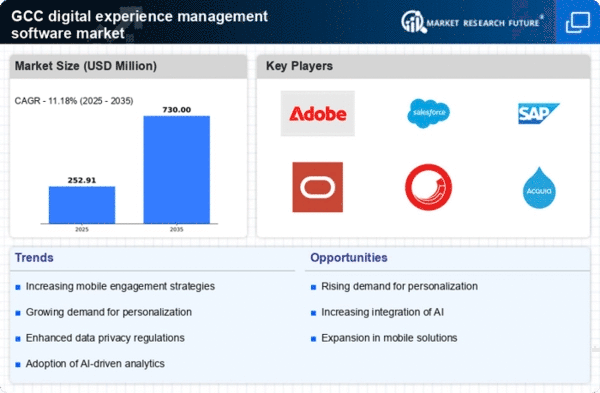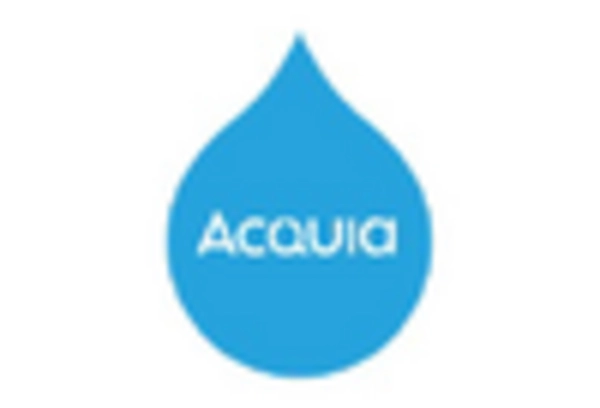Growing Adoption of Cloud-Based Solutions
The digital experience-management-software market is experiencing a significant shift towards cloud-based solutions. This trend is largely attributed to the flexibility and scalability that cloud technologies offer. In the GCC, businesses are increasingly migrating to cloud platforms to streamline operations and reduce costs. Reports indicate that the cloud services market in the region is projected to grow at a CAGR of 25% over the next five years. As organizations seek to enhance their digital capabilities, the integration of cloud-based experience management tools is becoming a strategic priority, enabling them to respond swiftly to market changes.
Emphasis on Omnichannel Experience Delivery
The digital experience-management-software market is increasingly focused on delivering seamless omnichannel experiences. As consumers engage with brands across multiple platforms, businesses in the GCC are recognizing the necessity of providing a consistent experience. This trend is prompting organizations to invest in software that integrates various touchpoints, ensuring that customer interactions are cohesive and personalized. Data indicates that companies that successfully implement omnichannel strategies can achieve a 30% increase in customer retention rates. Consequently, the demand for digital experience-management solutions that facilitate omnichannel delivery is on the rise.
Rising Demand for Enhanced Customer Engagement
The digital experience-management-software market is witnessing a notable surge in demand for solutions that enhance customer engagement. Businesses in the GCC are increasingly recognizing the importance of creating meaningful interactions with their customers. This shift is driven by the need to improve customer satisfaction and loyalty, which are critical for long-term success. According to recent data, companies that prioritize customer engagement can see an increase in revenue by up to 20%. As organizations strive to differentiate themselves in a competitive landscape, the adoption of digital experience-management software becomes essential for fostering deeper connections with their audience.
Regulatory Compliance and Governance Requirements
The digital experience-management-software market is influenced by the growing need for regulatory compliance and governance in the GCC. As data protection laws become more stringent, organizations are compelled to adopt solutions that ensure compliance with local regulations. This necessity is driving the demand for experience management software that incorporates robust security features and data governance capabilities. Recent findings suggest that businesses that prioritize compliance can mitigate risks and enhance their reputation, ultimately leading to increased customer trust. Therefore, the alignment of digital experience management tools with regulatory frameworks is becoming a critical driver in the market.
Increased Investment in Digital Transformation Initiatives
The digital experience-management-software market is benefiting from heightened investment in digital transformation initiatives across various sectors in the GCC. Organizations are allocating substantial budgets to upgrade their digital infrastructure, aiming to improve operational efficiency and customer experiences. Recent statistics suggest that companies in the region are expected to invest over $10 billion in digital transformation by 2026. This influx of capital is likely to drive the adoption of advanced experience management solutions, as businesses seek to leverage technology to meet evolving consumer expectations and enhance their competitive edge.
















